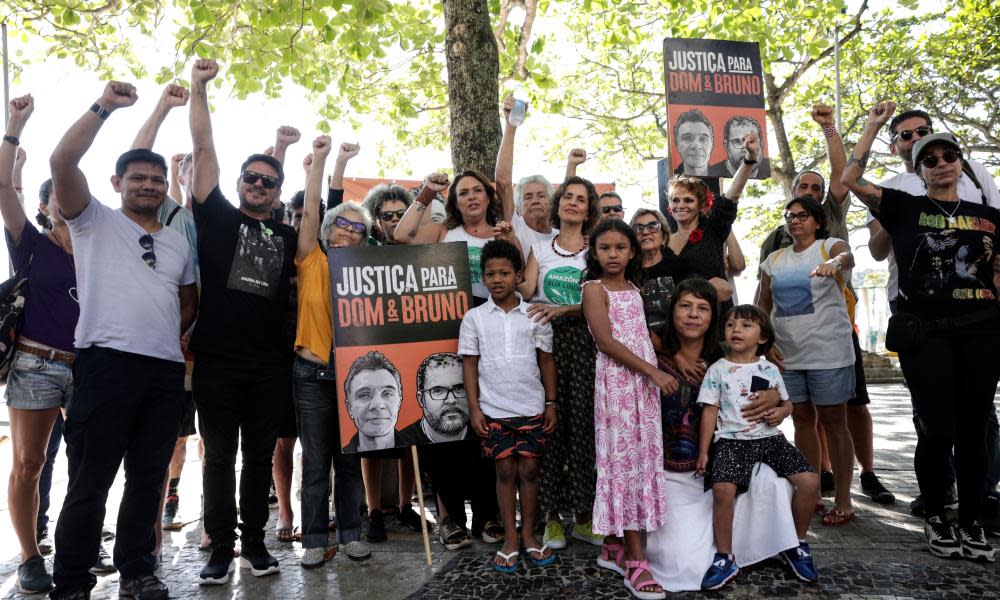Tributes paid to Dom Phillips and Bruno Pereira a year on from their deaths

Indigenous leaders, politicians and friends and relatives of Dom Phillips and Bruno Pereira have paid tribute to the two men on the anniversary of their murders in the Brazilian Amazon.
The British journalist and Brazilian Indigenous expert were ambushed and killed on 5 June 2022 while travelling by boat through the remote Javari valley region.
On Monday, hundreds of supporters gathered in cities including Rio, Belém in the Amazon, and the capital Brasília to remember their lives and the causes they cherished.
“The best way to honour them is to ensure their struggle wasn’t in vain,” the Brazilian president, Luiz Inácio Lula da Silva, declared as his government announced details of its plans to halt Amazon deforestation by 2030.
Phillips’s widow, Alessandra Sampaio, fought back tears as she spoke of her bereavement during an event on Copacabana beach.
“The truth is I lost the love of my life. I wish I wasn’t here giving interviews. I don’t want any of this. I’d like to go back to the simple life I had with Dom. We wanted to grow old together and this was stolen from me, it was stolen from my family and my friends – all because of greed and the previous government’s deliberate lack of control [in the Amazon],” she said.
Ex-president Jair Bolsonaro’s dismantling of Indigenous and environmental protections was widely blamed for soaring deforestation and creating the lawless backdrop against which last year’s murders occurred.

But Sampaio – who is preparing to launch the Dom Phillips Institute focused on the defence of Indigenous communities and the environment – said she was determined to continue her husband’s fight for the Amazon.
“I feel so angry but I try not to focus on this. I’m trying to move forwards and do what’s possible in Dom’s name to promote conservation,” she said, calling for greater government efforts to protect the Indigenous activists battling to protect their ancestral lands from illegal miners, poachers and drug traffickers.
“It’s intolerable that Indigenous people are still under threat and are still being killed. When will this stop? Wasn’t the death of Dom and Bruno enough?” Sampaio said.
More than 3,500 miles away in the Amazon, Indigenous activists travelled to the spot on the Itaquaí River where Phillips and Pereira were killed to erect two white crosses paying tribute to the men.
“The idea is to mark … the place where they were murdered … to ensure it’s never forgotten,” Carlos Travassos, an Indigenous specialist who is helping carry on Pereira’s work, said in a recent interview.
At the presidential palace in Brasília, top politicians and diplomats paid tribute to Phillips and Pereira at an event marking World Environment Day attended by Lula.
Lula said he was determined to change the impression the world had been given of the Amazon after last year’s crimes as “a lawless land on the brink of destruction which posed a huge threat to the battle against the climate emergency”.
The environment minister, Marina Silva, remembered how the men were “barbarously murdered … defending a cause that the state should have been defending” during Bolsonaro’s environmentally devastating administration.
“Exactly one year ago, this crime shocked the world and exposed the fragility of an Amazon that had been surrendered to organised crime [groups] that tear down the forest and kill anyone who crosses their path to defend the forest and its native peoples,” Silva said.
Silva remembered how one of Lula’s first acts after taking over from Bolsonaro in January was to create the ministry of Indigenous peoples, in order to halt “the atrocities” committed against Brazil’s native peoples.
Beto Marubo, a prominent Javari leader who is among those who has received death threats, attended the Rio memorial and said he was encouraged to see people around the world championing the causes Pereira and Phillips have come to represent.
But Marubo voiced disappointment that the Javari valley had yet to witness an emphatic intervention from Lula’s new leftwing government.
A floating federal police base has been installed in Atalaia do Norte, the port town nearest to the entrance of the Javari valley Indigenous territory, but activists say little else has been done.
“We thought that by now we’d have the army, the federal police and the navy working together in the region … but we don’t. And the same issues … that caused the deaths of Dom and Bruno persist,” said Marubo, who worked with Pereira for more than a decade.
“Indigenous leaders are still being threatened … outsiders continue to invade the Indigenous territory. Absolutely nothing has changed,” Marubo said, adding: “We aren’t interested in [the government’s] good intentions. We want to see things happen.”
On the eve of Monday’s commemorations, it emerged that federal police had charged the alleged leader of a “transnational criminal organisation” with masterminding last year’s murders. Ruben Dario da Silva Villar is accused of being the boss of an illegal poaching network that pillaged the waterways and forests of the Javari valley territory – and whose activities Pereira was trying to thwart by training Indigenous patrol teams.
The indictment said evidence gathered by police suggested “the steps of Bruno and Dom were being monitored by the criminal organisation” in the days leading up to the crime.
Speaking on Copacabana beach, Marubo vowed Indigenous activists would continue struggling in Pereira’s name. “It’s matter of honour, of ethics and commitment to the cause,” he said, urging journalists to do the same by travelling to the Amazon to cover Indigenous issues.
“Dom gave his life for this,” Marubo said.

 Yahoo News
Yahoo News 
